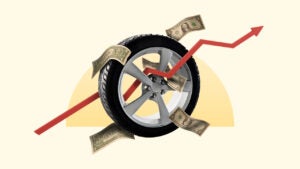How does ‘buy now, pay later’ affect your credit score?

Key takeaways
- Buy now, pay later (BNPL) options allow consumers to split purchases into manageable installments, often without interest.
- If the BNPL service reports activity to credit bureaus, it can impact your credit score.
- Take the time to understand the terms of the BNPL service before signing up.
If you’ve shopped online or in stores recently, you’ve likely encountered the ‘buy now, pay later’ (BNPL) option, tempting you to split your payment into smaller installments. According to Consumer Financial Protection Bureau research, 21.2 percent of consumers with a credit report financed at least one purchase with a BNPL loan, which is up from 17.6 percent in 2021. It’s not surprising that BNPL is on the rise — if you’re on a tight budget, paying for your purchases over time can seem like a great plan.
These installment payment services have caught the eye of many shoppers, and now, even traditional credit card issuers are jumping on the bandwagon variations. However, it’s important to understand how this choice could impact your finances and your credit score. Discover how BNPL works, how it affects your credit and how to avoid BNPL pitfalls before you sign up.
How does buy now, pay later work?
Buy now, pay later is a financing option that allows you to split your purchase payments into multiple installments. It’s often interest-free as long as you make the payments on time.
BNPL services are becoming more common online and in-store, popping up as a payment option during checkout.
The process is straightforward:
- Choose the BNPL option at checkout.
- Make the initial payment at the time of purchase.
- Pay the remaining balance in a series of scheduled installments.
For example, if you buy a $200 item, you might pay $50 at checkout and then $50 every two weeks until the balance is paid off. Many shoppers choose this option to better manage their budgets by spreading the cost of a purchase over time.
Does BNPL require a credit check?
BNPL services are often used as an alternative to credit cards. Mary Rosado, a Staten Island, New York, resident, says she uses the BNPL services Afterpay and Klarna all the time.
“They don’t ask for your Social Security number, so I can’t see how they can pull your credit report,” Rosado says. “I use them, to be honest, because I have bad credit and can’t get credit cards.”
Rosado is correct that the services she uses perform a soft credit pull that doesn’t ding credit scores. Soft credit checks verify your identity and evaluate your financial behavior. Since they don’t involve a full review of your credit report, they are less intrusive and won’t leave a mark on your credit history.
However, some BNPL services do use a hard credit check. For example, Affirm has a 0 percent APR option with no credit check that breaks your payoff into four biweekly payments, but its longer-term installment loans rely on a hard inquiry. PayPal’s “Pay in 4” only uses a soft credit pull, but PayPal Credit requires a full credit check.
How hard credit checks affect your score
When considering BNPL as a payment option, it’s critical to understand whether it requires a hard credit check and how this may impact your credit score. Applications for a new credit account for 10 percent of the FICO score calculation, so a hard pull may cause your score to dip.
“Analysis of millions of credit files that we use to build our FICO scores consistently shows that those with higher numbers of recently applied-for accounts and recently acquired accounts do represent a slightly elevated risk of nonpayment down the line,” says Ethan Dornhelm, vice president of Scores and Predictive Analytics for FICO.
One hard inquiry isn’t going to significantly tank your score. “We generally say that one inquiry is unlikely to impact the score by more than five points,” says Dornhelm. “But for a rare segment of the population, that could be a meaningful impact.”
If you’re applying for a mortgage or refinancing, for example, just a few points could put you in a different interest rate tier.
A bigger issue may occur if you’re using hard inquiries regularly. “If they report and you go out and get five of these loans, it looks like you’re desperate for credit,” says Howard Dvorkin, CPA and chairman of Debt.com. “You have to be very careful.”
How does BNPL affect credit reporting?
Another key factor to consider with BNPL services is whether your account activity will be reported to credit bureaus, potentially affecting your credit score. In December 2021, Equifax took the lead in including BNPL loans on credit reports, with Experian and TransUnion quickly following.
However, not all BNPL providers report your account activity. Whether your BNPL usage appears on your credit report can also depend on the specific loan product offered by the provider.
For instance, for plans originating before April 1, 2025, Affirm does not report activity on its four biweekly payments offer, but longer-term loans are reported as installment loans. For plans before April 1, 2025, the company only reports your first installment loan, not subsequent ones, unless your account is 30 days or more overdue. However, beginning April 1, 2025, all Affirm payment plans and associated repayment activity are reported to Experian. Affirm also began reporting to TransUnion in May and “may report to other credit bureaus in the future.”
Some BNPL products, like PayPal Credit, may offer revolving lines of credit rather than fixed loan payments. With revolving accounts, the amount of available credit you use (called credit utilization) also significantly impacts your credit score — accounting for 30 percent of it.
In April 2024, Apple became the first major BNPL provider to report account histories for all of its “pay in four” customers to a credit bureau (Experian). Currently, this information is coded so that it is not visible to lenders, and it’s likely to be some time before it’s factored into a borrower’s credit score.
However, as BNPL services become more popular, the relationship between service providers and credit bureaus will likely continue to evolve.
How can BNPL affect your credit?
Missed payments can be harmful to your credit, but remember that not all BNPL programs report your activity.
If you miss a couple of payments but then catch up, your score might come away unscathed. However, if you default on your remaining balance, the debt can be sent to collections, and the credit bureaus will be notified. This typically happens when an account is 90 to 120 days overdue and can vary depending on the provider’s policy.
Once a BNPL provider reports missed payments to the credit bureaus, it will likely show up as a negative item on your credit report and trigger a score drop. Because payment history is the most important factor in the FICO calculation, comprising 35 percent of your score, missing BNPL payments can have a significant impact.
On the positive side, if a BNPL provider reports your on-time payments to the credit bureaus, it can help build your credit history and improve your credit score. Consistent, timely payments demonstrate responsible credit behavior. That can be helpful if you’re trying to establish or rebuild your credit. BNPL accounts can also diversify your credit mix, which accounts for 10 percent of your score.
What are the other risks of BNPL loans?
Beyond potential credit risks, there can be other drawbacks to using BNPL services.
For example, splitting payments into smaller installments can make purchases seem more affordable, potentially leading you to buy more than you can comfortably afford. For example, in 2023, U.S. shoppers who used BNPL on Black Friday spent 48 percent more than those using other payment methods.
This can quickly result in accumulating debt, especially if you use multiple BNPL services simultaneously. And if you miss payments, late fees can accumulate, further increasing the total cost of your purchases.
Returning items bought with BNPL can also create complications. You might still be responsible for making payments until the return has been processed and added to your account, even if you’ve already returned the item. Additionally, some BNPL providers charge extra fees for services like rescheduling payments or early repayment, adding hidden costs to your purchases.
Inconsistent reporting practices among BNPL providers can also create confusion about how your BNPL activity affects your credit, making it harder to manage your credit health.
How can you avoid BNPL pitfalls?
Before using any BNPL service, read the terms and conditions carefully to understand the credit check requirements and reporting practices.
To ensure you don’t inadvertently put your credit score in jeopardy, ask yourself the following questions:
- Does the BNPL program require a credit check?
- Will your payment activity be reported to the credit bureaus?
- Does the service run a hard inquiry or soft inquiry when you apply?
- What happens if you make a late or missed payment?
Regularly monitor your credit report to ensure all BNPL activity is accurately reflected and catch any errors early. If you notice any discrepancies, notify the BNPL service provider and the credit reporting agency right away.
Remember, you’ll need to stay on top of your BNPL payments to avoid late fees and potential negative impacts on your credit score. Consider setting up automatic payments, and use BNPL services wisely to ensure you can comfortably afford the installment payments without overstretching your budget. Following these guidelines can help you use BNPL services responsibly, so you can maintain a healthy credit profile.
The bottom line
BNPL plans can be a great option for those who lack access to traditional credit. They allow for flexible repayment terms, with some BNPL providers only performing a soft credit check. Yet, even though BNPL options that require hard credit checks and report your payments to credit bureaus can be riskier, they can also work in your favor, as long as you use them sparingly and pay on time.
“For me, BNPL is more manageable as long as I don’t get carried away,” says Rosado, who, as a rule, tries to keep spending under $400 so her payments aren’t more than $100 at a time.
Dvorkin recommends: “If you can’t afford it, don’t buy it.” If you decide to use BNPL, he suggests automating payments so you don’t forget to pay.
As with any credit product, your main goal should be to keep debt levels low and pay that debt on time, as these behaviors will likely help your credit score in the long run.
Why we ask for feedback Your feedback helps us improve our content and services. It takes less than a minute to complete.
Your responses are anonymous and will only be used for improving our website.







